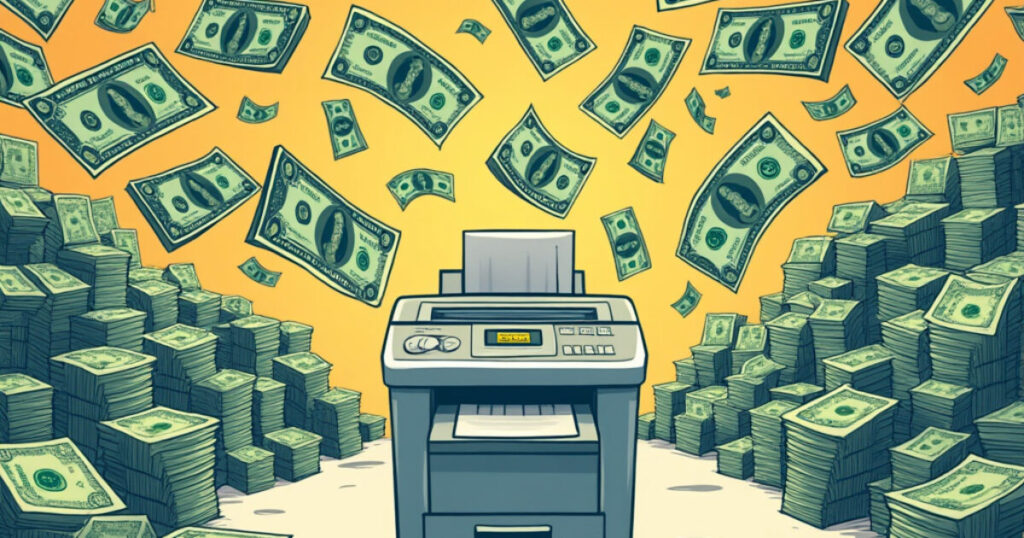Title: The Economic Consequences of Current U.S. Policies
In recent years, particularly during the Biden-Harris administration, inflation has emerged as a critical issue affecting the American economy. Prices for essentials like groceries, gasoline, and electricity have soared to unprecedented levels, eroding the purchasing power of consumers. Under this administration, a $100,000 income now effectively feels like $83,000 due to a staggering 17% loss in value caused by inflation averaging 4.3% per year. Although officials may claim that inflation rates have cooled recently, the cumulative effects are unmistakable; consumers still face prices that remain high compared to when President Trump left office. The financial burden of these policies demonstrates a significant departure from previous economic trends, raising concerns about the long-term impacts on American households.
The situation is exacerbated by the administration’s approach to fiscal management, which has involved extensive government spending and increased national debt. Reports indicate that an astonishing $8 trillion has been added to the national debt during Biden’s tenure, with $4.3 trillion accrued in just the past year. The total debt now approaches $36 trillion, representing 124% of the country’s GDP. Such levels of debt pose a grave threat to economic stability, demanding not only a reassessment of spending habits but also a shift toward more responsible fiscal policies. Observers are wary of potential parallels to historical inflation crises in places like Weimar Germany and Venezuela and fear the repercussions that could stem from the Federal Reserve’s decisions amid such an economy.
Amid rising concerns over inflation and economic mismanagement, a call for fiscal responsibility has resurfaced. Former President Donald Trump has indicated a willingness to return to powerful fiscal policies characterized by tax reductions and a smaller government footprint. His promises to cut wasteful regulations and put an end to imprudent overseas military engagements resonate with many who believe this could allow for a recovery from the current financial downturn. The introduction of measures to enhance government efficiency, including proposals to collaborate with business leaders like Elon Musk, may play a role in fostering growth and addressing waste that has accumulated in various sectors, stifling economic potential.
Despite the prospect of a shift back to Trump’s policies, the economic ramifications of the Biden administration’s actions will likely persist long after any policy alterations occur. The compounded financial fallout from significant debt accumulation and inflated prices means that consumers will continue to feel the pinch. Many are compelled to seek alternatives in investment strategies that provide stability against volatile inflation pressures. The concern remains that unreformed fiscal approaches could lead to further debt increases and market destabilizations unless a meaningful corrective strategy is implemented.
Politically, the economic climate is also fraught with uncertainty, as proposals from the Democratic party could push the U.S. towards increasingly radical policies. Specifically, suggestions for taxing unrealized capital gains could provoke significant market disruptions. Such measures could force investors to sell assets precipitously, driving a market collapse and pushing middle-class families into financial crises they cannot afford. In contrast, Trump’s proposals aim to alleviate taxes on key earnings, reinforcing consumer purchasing power and offering potential for economic rejuvenation as people would have more disposable income to contribute to market demands.
As a reaction to the turbulent economic conditions, many Americans are pivoting towards traditional safe-haven assets like gold, indicating a strategic shift in personal finance philosophies amidst growing fears of inflationary pressures and possible recession. The emergence of Self-Directed Gold IRAs presents an alternative path for retirement saving that shields investment from inflationary impacts and tax burdens. The promotion of gold as a stable asset underlines a broader transitional economic perspective that favors tangible investments over speculative or inflated financial instruments in an environment of uncertainty. Given the compelling circumstances, exploring gold investment appears increasingly viable as consumers respond to a volatile financial scenario and seek security in their financial futures.

